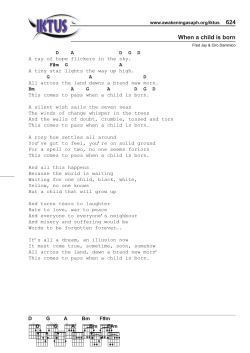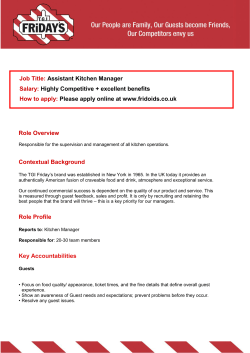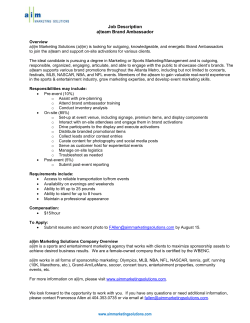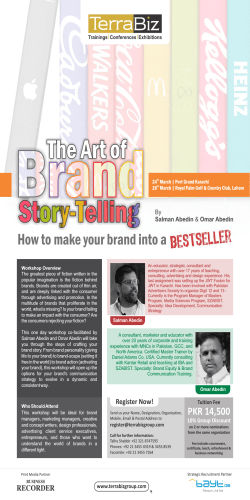
7 REASONS WHY SOCIAL LISTENING IS IMPORTANT
7 REASONS WHY SOCIAL LISTENING IS IMPORTANT As you are reading this whitepaper millions of consumers are talking about brands, products and customer service issues on social media. As traditional marketing has evolved into digital marketing, Customer Generated Media is replacing mass media. Nowadays customers are more trusting of experiences that customers are talking about on Facebook, Twitter, online blogs or discussion boards than traditional marketing or advertising messages. Taking Consumer Generated Media seriously via active social listening is critical for all B2C companies that consider themselves socially devoted. Still not convinced? Lets take a look at the reasons why social listening is important for your business! 1) SOCIAL MEDIA STRATEGY If your business is serious about social media then you definitely want to integrate social listening into your social media strategy. Learning what people are saying about your brand or industry is an important tool for determining an effective social media strategy. Focused listening will tell you which social networks your audience is most actively using and the general sentiment about your brands, products, competitors or industry. By using social listening to determine your social media strategy, your company will save both time and money. SOCIALBAKERS TIP: Create a Conversation Map to illustrate the social landscape of your brand - This map should focus on Which Networks Conversation is Most Common, the Sentiment of the Conversation, and What Are The Most Common Topics people associate with your brand. 2) PERFORMANCE MEASURMENT Besides the fact that social listening allows you to measure and evaluate your Social Media Strategy, it also helps measure tactics for more short term campaigns. You have the ability to analyze quantitative metrics (e.g. Volume of Conversation) and qualitative metrics (e.g. Sentiment of Conversation). This analysis provides valuable insights to determine your social performance for Above the Line (ATL), Below the Line (BTL) and integrated campaigns. SOCIALBAKERS TIP: Measure the Volume of Mentions about your brand or product before, during and after a campaign. Pay attention to the days with the greatest and least amount of mentions to understand which content was effective and which content was not. Additionally, monitor the Sentiment of conversation about your brand or product and adjust the content that you are posting accordingly. Get more information at www.socialbakers.com 3) BRAND REPUTATION In today's social age it is the customers who are determining conversation about a brand, product or industry. Many brands are learning the best practices for how to manage customer service issues on social media. By actively using social listening your brand can successfully identify potentially harmful conversation and ameliorate the situation before it has a drastic impact on the reputation of your brand. Additionally, social listening is an extremely valuable tool for developing a Brand Reputation Strategy.. SOCIALBAKERS TIP: Create both a Social Media Issues Management Plan and a Social Media Crisis Management Plan. Both plans involve direct action, however, each plan requires different methods and levels of involvement. Be prepared to switch to 24/7 monitoring if there is a large enough social media crisis 4) PRODUCT DEVELOPEMENT One of the greatest benefits of social listening is that you are able to receive customer feedback about your products, brand or industry. You should treat this feedback the same way you would treat feedback from a focus group. Analyze what your consumers are saying to discover valuable insights and adjust your business strategies to fit the needs of the consumer. Be prepared to receive honest feedback that sometimes criticizes some aspect of your business. This criticism is valuable because you have the ability to improve your product, customer service or more general business strategies. SOCIALBAKERS TIP: Listen to users who are constructively criticizing some aspect of your business. If you engage these users, you may be surprised to find that many are willing to offer meaningful feedback. Moreover, if you continue to foster these relationships you may find high quality leads for potential clients, up-selling opportunities or the development of brand ambassadors. 5) COMPETITIVE INSIGHTS When conducting social listening campaigns you should not solely monitor conversations about your business or selected competitors. Instead, try to allocate time and resources to monitor more general discussion about your industry as a whole. When monitoring industry conversations ask yourself questions such as: What are the reasons that customers are typically unhappy in your field of work? Is there a product or service that consumers desire but is not available? Is there a topic that is frequently discussed, which your brand could use as a communication tool? Receiving feedback about your industry may surprise you, and often these insights are the most interesting and valuable for developing your overall business strategies. Get more information at www.socialbakers.com SOCIALBAKERS TIP: Search for the most common topics surrounding Customer Satisfaction and Discontent. Then try to emulate any issues that customers are satisfied with and determine solutions to address customer discontent. Additionally, if there is a recently introduced topic that is being frequently discussed, join the conversation to gain Direct Customer Feedback about what consumers are looking for in your brand or industry. 6) BENCHMARKING Social listening is a great tool for benchmarking your brands to your competitors. By measuring the volume of conversation about your brand and your competitors, you are able to benchmark your social media performance. Remember- the volume of conversation around your brand is important. Part of the consumer decision process is to see what others have said about your product or service. If there are no reviews or relevant mentions about your product or service, then a potential customer may search for a company that has generated more social media conversation. SOCIALBAKERS TIP: Focus on both the Volume of Conversation and the Sentiment surrounding your product or service. Additionally, remember that you have the ability to influence both the volume of conversation and the sentiment by actively engaging in the discussion. If you discover negative reviews, do not delete them. Instead, acknowledge that there is a problem, adjust your business plans accordingly and incentivize satisfied customers to create positive publicity reviews. 7) KEY INFLUENCERS According to the Word of Mouth Marketing Association (WOMMA), an Influencer is defined as a “person who has a greater than average reach or impact through word of mouth in a relevant marketplace.” Influencers love to talk about products, services and customer service issues both online and offline. Active social listening can help you identify key influencers so you can gather valuable insight about your products, brand, or industry. Once you identify your key influencers, you should create an Influencer Management Plan by developing these important relationships. SOCIALBAKERS TIP: When identifying influencers look primarily for the following criteria: The Influencer’s Social Reach, the Frequency and Volume of their social activities and their Post Engagement Rates. Secondarily, you should learn how many online platforms they are actively using and what their position is in the offline world. FURTHER QUESTIONS? PLEASE DO NOT HESITATE AND CONTACT US! YOU CAN REACH OUR SOCIAL MEDIA EXPERT TEAM AT experts@socialbakers.com Get more information at www.socialbakers.com
© Copyright 2025










